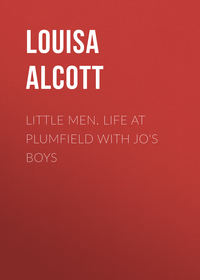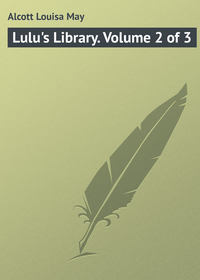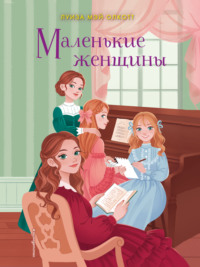 полная версия
полная версияRose in Bloom
"You could do that, but I never can. Answer me this, Rose, and answer truly as you love me. If you had been taken into a house, a friendless, penniless, forlorn girl, and for years been heaped with benefits, trusted, taught, loved, and made, oh, so happy! could you think it right to steal away something that these good people valued very much? To have them feel that you had been ungrateful, had deceived them, and meant to thrust yourself into a high place not fit for you; when they had been generously helping you in other ways, far more than you deserved. Could you then say as you do now, 'Be happy and never mind them'?"
Phebe held Rose by the shoulders now, and searched her face so keenly that the other shrunk a little; for the black eyes were full of fire, and there was something almost grand about this girl who seemed suddenly to have become a woman. There was no need of words to answer the questions so swiftly asked; for Rose put herself in Phebe's place in the drawing of a breath, and her own pride made her truthfully reply, —
"No: I could not!"
"I knew you'd say that, and help me do my duty;" and all the coldness melted out of Phebe's manner, as she hugged her little mistress close, feeling the comfort of sympathy even through the blunt sincerity of Rose's words.
"I will if I know how. Now come and tell me all about it;" and, seating herself in the great chair which had often held them both, Rose stretched out her hands as if glad and ready to give help of any sort.
But Phebe would not take her accustomed place; for, as if coming to confession, she knelt down upon the rug, and, leaning on the arm of the chair, told her love-story in the simplest words.
"I never thought he cared for me until a little while ago. I fancied it was you, and even when I knew he liked to hear me sing I supposed it was because you helped; and so I did my best, and was glad you were to be a happy girl. But his eyes told the truth; then I saw what I had been doing, and was frightened. He did not speak; so I believed, what is quite true, that he felt I was not a fit wife for him, and would never ask me. It was right: I was glad of it, yet I was proud; and, though I did not ask or hope for any thing, I did want him to see that I respected myself, remembered my duty, and could do right as well as he. I kept away; I planned to go as soon as possible, and resolved that at this concert I would do so well he should not be ashamed of poor Phebe and her one gift."
"It was this that made you so strange, then; preferring to go alone, and refusing every little favor at our hands?" asked Rose, feeling very sure now about the state of Phebe's heart.
"Yes; I wanted to do every thing myself, and not owe one jot of my success, if I had any, to even the dearest friend I've got. It was bad and foolish of me, and I was punished by that first dreadful failure. I was so frightened, Rose! My breath was all gone, my eyes so dizzy I could hardly see, and that great crowd of faces seemed so near I dared not look. If it had not been for the clock, I never should have got through; and when I did, not knowing in the least how I'd sung, one look at your distressed face told me that I'd failed."
"But I smiled, Phebe, – indeed I did, – as sweetly as I could; for I was sure it was only fright," protested Rose, eagerly.
"So you did: but the smile was full of pity, not of pride, as I wanted it to be; and I rushed into a dark place behind the organ, feeling ready to kill myself. How angry and miserable I was! I set my teeth, clenched my hands, and vowed that I would do well next time, or never sing another note. I was quite desperate when my turn came, and felt as if I could do almost any thing; for I remembered that he was there. I'm not sure how it was, but it seemed as if I was all voice; for I let myself go, trying to forget every thing except that two people must not be disappointed, though I died when the song was done."
"O Phebe, it was splendid! I nearly cried, I was so proud and glad to see you do yourself justice at last."
"And he?" whispered Phebe, with her face half hidden on the arm of the chair.
"Said not a word: but I saw his lips tremble and his eyes shine; and I knew he was the happiest creature there, because I was sure he did think you fit to be his wife, and did mean to speak very soon."
Phebe made no answer for a moment, seeming to forget the small success in the greater one which followed, and to comfort her sore heart with the knowledge that Rose was right.
"He sent the flowers; he came for me, and, on the way home, showed me how wrong I had been to doubt him for an hour. Don't ask me to tell that part, but be sure I was the happiest creature in the world then." And Phebe hid her face again, all wet with tender tears, that fell soft and sudden as a summer shower.
Rose let them flow undisturbed, while she silently caressed the bent head; wondering, with a wistful look in her own wet eyes, what this mysterious passion was, which could so move, ennoble, and beautify the beings whom it blessed.
An impertinent little clock upon the chimney-piece striking eleven broke the silence, and reminded Phebe that she could not indulge in love-dreams there. She started up, brushed off her tears, and said resolutely, —
"That is enough for to-night. Go happily to bed, and leave the troubles for to-morrow."
"But, Phebe, I must know what you said," cried Rose, like a child defrauded of half its bedtime story.
"I said 'No.'"
"Ah! but it will change to 'Yes' by and by; I'm sure of that: so I'll let you go to dream of 'him.' The Campbells are rather proud of being descendants of Robert Bruce; but they have common-sense and love you dearly, as you'll see to-morrow."
"Perhaps." And, with a good-night kiss, poor Phebe went away, to lie awake till dawn.
CHAPTER VIII.
BREAKERS AHEAD
Anxious to smooth the way for Phebe, Rose was up betimes, and slipped into Aunt Plenty's room before the old lady had got her cap on.
"Aunty, I've something pleasant to tell you; and, while you listen, I'll brush your hair, as you like to have me," she began, well aware that the proposed process was a very soothing one.
"Yes, dear: only don't be too particular, because I'm late and must hurry down, or Jane won't get things straight; and it does fidget me to have the salt-cellars uneven, the tea-strainer forgotten, and your uncle's paper not aired," returned Miss Plenty, briskly unrolling the two gray curls she wore at her temples.
Then Rose, brushing away at the scanty back-hair, led skilfully up to the crisis of her tale by describing Phebe's panic and brave efforts to conquer it; all about the flowers Archie sent her; and how Steve forgot, and dear, thoughtful Archie took his place. So far it went well, and Aunt Plenty was full of interest, sympathy, and approbation; but when Rose added, as if it was quite a matter of course, "So, on the way home, he told her he loved her," a great start twitched the gray locks out of her hands as the old lady turned round, with the little curls standing erect, exclaiming, in undisguised dismay, —
"Not seriously, Rose?"
"Yes, Aunty, very seriously. He never jokes about such things."
"Mercy on us! what shall we do about it?"
"Nothing, ma'am, but be as glad as we ought, and congratulate him as soon as she says 'Yes.'"
"Do you mean to say she didn't accept at once?"
"She never will if we don't welcome her as kindly as if she belonged to one of our best families, and I don't blame her."
"I'm glad the girl has so much sense. Of course we can't do any thing of the sort; and I'm surprised at Archie's forgetting what he owes to the family in this rash manner. Give me my cap, child: I must speak to Alec at once." And Aunt Plenty twisted her hair into a button at the back of her head with one energetic twirl.
"Do speak kindly, Aunty, and remember that it was not Phebe's fault. She never thought of this till very lately, and began at once to prepare for going away," said Rose, pleadingly.
"She ought to have gone long ago. I told Myra we should have trouble somewhere as soon as I saw what a good-looking creature she was; and here it is as bad as can be. Dear, dear! why can't young people have a little prudence?"
"I don't see that any one need object if Uncle Jem and Aunt Jessie approve; and I do think it will be very, very unkind to scold poor Phebe for being well-bred, pretty, and good, after doing all we could to make her so."
"Child, you don't understand these things yet; but you ought to feel your duty toward your family, and do all you can to keep the name as honorable as it always has been. What do you suppose our blessed ancestress, Lady Marget, would say to our oldest boy taking a wife from the poor-house?"
As she spoke, Miss Plenty looked up, almost apprehensively, at one of the wooden-faced old portraits with which her room was hung, as if asking pardon of the severe-nosed matron, who stared back at her from under the sort of blue dish-cover which formed her head-gear.
"As Lady Marget died about two hundred years ago, I don't care a pin what she would say; especially as she looks like a very narrow-minded, haughty woman. But I do care very much what Miss Plenty Campbell says; for she is a very sensible, generous, discreet, and dear old lady, who wouldn't hurt a fly, much less a good and faithful girl who has been a sister to me. Would she?" entreated Rose, knowing well that the elder aunt led all the rest more or less.
But Miss Plenty had her cap on now, and consequently felt herself twice the woman she was without it; so she not only gave it a somewhat belligerent air by setting it well up, but she shook her head decidedly, smoothed down her stiff white apron, and stood up as if ready for battle.
"I shall do my duty, Rose, and expect the same of others. Don't say any more now: I must turn the matter over in my mind; for it has come upon me suddenly, and needs serious consideration."
With which unusually solemn address, she took up her keys and trotted away, leaving her niece to follow with an anxious countenance, uncertain whether her championship had done good or ill to the cause she had at heart.
She was much cheered by the sound of Phebe's voice in the study; for Rose was sure that if Uncle Alec was on their side all would be well. But the clouds lowered again when they came in to breakfast: for Phebe's heavy eyes and pale cheeks did not look encouraging; while Dr. Alec was as sober as a judge, and sent an inquiring glance toward Rose now and then as if curious to discover how she bore the news.
An uncomfortable meal, though all tried to seem as usual, and talked over last night's events with all the interest they could. But the old peace was disturbed by a word, as a pebble thrown into a quiet pool sends tell-tale circles rippling its surface far and wide. Aunt Plenty, while "turning the subject over in her mind," also seemed intent on upsetting every thing she touched, and made sad havoc in her tea-tray; Dr. Alec unsociably read his paper; Rose, having salted instead of sugared her oatmeal, absently ate it feeling that the sweetness had gone out of every thing; and Phebe, after choking down a cup of tea and crumbling a roll, excused herself, and went away, sternly resolving not to be a bone of contention to this beloved family.
As soon as the door was shut, Rose pushed away her plate, and going to Dr. Alec peeped over the paper with such an anxious face that he put it down at once.
"Uncle, this is a serious matter, and we must take our stand at once; for you are Phebe's guardian and I am her sister," began Rose, with pretty solemnity. "You have often been disappointed in me," she continued, "but I know I never shall be in you; because you are too wise and good to let any worldly pride or prudence spoil your sympathy with Archie and our Phebe. You won't desert them, will you?"
"Never!" answered Dr. Alec, with gratifying energy.
"Thank you! thank you!" cried Rose. "Now, if I have you and aunty on my side, I'm not afraid of anybody."
"Gently, gently, child. I don't intend to desert the lovers; but I certainly shall advise them to consider well what they are about. I'll own I am rather disappointed; because Archie is young to decide his life in this way, and Phebe's career seemed settled in another fashion. Old people don't like to have their plans upset, you know," he added, more lightly; for Rose's face fell as he went on.
"Old people shouldn't plan too much for the young ones then. We are very grateful, I'm sure; but we cannot always be disposed of in the most prudent and sensible way; so don't set your hearts on little arrangements of that sort, I beg," and Rose looked wondrous wise; for she could not help suspecting even her best uncle of "plans" in her behalf.
"You are quite right: we shouldn't; yet it is very hard to help it," confessed Dr. Alec, with a conscious air; and, returning hastily to the lovers, he added kindly, —
"I was much pleased with the straightforward way in which Phebe came to me this morning, and told me all about it, as if I really was her guardian. She did not own it in words: but it was perfectly evident that she loves Archie with all her heart; yet, knowing the objections which will be made, very sensibly and bravely proposes to go away at once, and end the matter, – as if that were possible, poor child," and the tender-hearted man gave a sigh of sympathy that did Rose good to hear, and mollified her rising indignation at the bare idea of ending Phebe's love affairs in such a summary way.
"You don't think she ought to go, I hope?"
"I think she will go."
"We must not let her."
"We have no right to keep her."
"O uncle! surely we have! Our Phebe, whom we all love so much."
"You forget that she is a woman now, and we have no claim upon her. Because we've befriended her for years is the very reason we should not make our benefits a burden, but leave her free; and, if she chooses to do this in spite of Archie, we must let her with a God-speed."
Before Rose could answer, Aunt Plenty spoke out like one having authority; for old-fashioned ways were dear to her soul, and she thought even love affairs should be conducted with a proper regard to the powers that be.
"The family must talk the matter over and decide what is best for the children, who of course will listen to reason and do nothing ill-advised. For my part, I am quite upset by the news, but shall not commit myself till I've seen Jessie and the boy. Jane, clear away, and bring me the hot water."
That ended the morning conference; and, leaving the old lady to soothe her mind by polishing spoons and washing cups, Rose went away to find Phebe, while the doctor retired to laugh over the downfall of brother Mac's match-making schemes.
The Campbells did not gossip about their concerns in public; but, being a very united family, it had long been the custom to "talk over" any interesting event which occurred to any member thereof, and every one gave his or her opinion, advice, or censure with the utmost candor. Therefore the first engagement, if such it could be called, created a great sensation, among the aunts especially; and they were in as much of a flutter as a flock of maternal birds when their young begin to hop out of the nest. So at all hours the excellent ladies were seen excitedly nodding their caps together, as they discussed the affair in all its bearings, without ever arriving at any unanimous decision.
The boys took it much more calmly. Mac was the only one who came out strongly in Archie's favor. Charlie thought the Chief ought to do better, and called Phebe "a siren, who had bewitched the sage youth." Steve was scandalized, and delivered long orations upon one's duty to society, keeping the old name up, and the danger of mésalliances; while all the time he secretly sympathized with Archie, being much smitten with Kitty Van himself. Will and Geordie, unfortunately home for the holidays, considered it "a jolly lark;" and little Jamie nearly drove his elder brother distracted by curious inquiries as to "how folks felt when they were in love."
Uncle Mac's dismay was so comical that it kept Dr. Alec in good spirits; for he alone knew how deep was the deluded man's chagrin at the failure of the little plot which he fancied was prospering finely.
"I'll never set my heart on any thing of the sort again; and the young rascals may marry whom they like. I'm prepared for any thing now: so if Steve brings home the washerwoman's daughter, and Mac runs away with our pretty chamber-maid, I shall say, 'Bless you my children,' with mournful resignation; for, upon my soul, that is all that's left for a modern parent to do."
With which tragic burst, poor Uncle Mac washed his hands of the whole affair, and buried himself in the counting-house while the storm raged.
About this time, Archie might have echoed Rose's childish wish, that she had not quite so many aunts; for the tongues of those interested relatives made sad havoc with his little romance, and caused him to long fervently for a desert island, where he could woo and win his love in delicious peace. That nothing of the sort was possible soon became evident; since every word uttered only confirmed Phebe's resolution to go away, and proved to Rose how mistaken she had been in believing that she could bring every one to her way of thinking.
Prejudices are unmanageable things; and the good aunts, like most women, possessed a plentiful supply: so Rose found it like beating her head against a wall to try and convince them that Archie was wise in loving poor Phebe. His mother, who had hoped to have Rose for her daughter, – not because of her fortune, but the tender affection she felt for her, – put away her disappointment without a word, and welcomed Phebe as kindly as she could for her boy's sake. But the girl felt the truth with the quickness of a nature made sensitive by love, and clung to her resolve all the more tenaciously, though grateful for the motherly words that would have been so sweet if genuine happiness had prompted them.
Aunt Jane called it romantic nonsense, and advised strong measures, – "kind, but firm, Jessie." Aunt Clara was sadly distressed about "what people would say" if one of "our boys" married a nobody's daughter. And Aunt Myra not only seconded her views by painting portraits of Phebe's unknown relations in the darkest colors, but uttered direful prophecies regarding the disreputable beings who would start up in swarms the moment the girl made a good match.
These suggestions so wrought upon Aunt Plenty that she turned a deaf ear to the benevolent emotions native to her breast, and taking refuge behind "our blessed ancestress, Lady Marget," refused to sanction any engagement which could bring discredit upon the stainless name which was her pride.
So it all ended where it began; for Archie steadily refused to listen to any one but Phebe, and she as steadily reiterated her bitter "No;" fortifying herself half unconsciously with the hope that, by and by, when she had won a name, fate might be kinder.
While the rest talked, she had been working; for every hour showed her that her instinct had been a true one, and pride would not let her stay, though love pleaded eloquently. So, after a Christmas any thing but merry, Phebe packed her trunks, rich in gifts from those who generously gave her all but the one thing she desired; and, with a pocketful of letters to people who could further her plans, she went away to seek her fortune, with a brave face and a very heavy heart.
"Write often, and let me know all you do, my Phebe; and remember I shall never be contented till you come back again," whispered Rose, clinging to her till the last.
"She will come back; for in a year I'm going to bring her home, please God," said Archie, pale with the pain of parting, but as resolute as she.
"I'll earn my welcome: then perhaps it will be easier for them to give and me to receive it," answered Phebe, with a backward glance at the group of caps in the hall, as she went down the steps on Dr. Alec's arm.
"You earned it long ago, and it is always waiting for you while I am here. Remember that, and God bless you, my good girl," he said, with a paternal kiss that warmed her heart.
"I never shall forget it!" and Phebe never did.
CHAPTER IX.
NEW-YEAR'S CALLS
"Now I'm going to turn over a new leaf, as I promised. I wonder what I shall find on the next page?" said Rose, coming down on New-Year's morning, with a serious face, and a thick letter in her hand.
"Tired of frivolity, my dear?" asked her uncle, pausing, in his walk up and down the hall, to glance at her with the quick, bright look she liked to bring into his eyes.
"No, sir, and that's the sad part of it; but I've made up my mind to stop while I can, because I'm sure it is not good for me. I've had some very sober thoughts lately; for, since my Phebe went away, I've had no heart for gayety: so it is a good place to stop and make a fresh start," answered Rose, taking his arm, and walking on with him.
"An excellent time! Now, how are you going to fill the aching void?" he asked, well pleased.
"By trying to be as unselfish, brave, and good as she is." And Rose held the letter against her bosom with a tender touch, for Phebe's strength had inspired her with a desire to be as self-reliant. "I'm going to set about living in earnest, as she has; though I think it will be harder for me than for her, because she stands alone, and has a career marked out for her. I'm nothing but a common-place sort of girl, with no end of relations to be consulted every time I wink, and a dreadful fortune hanging like a millstone round my neck, to weigh me down if I try to fly. It is a hard case, uncle, and I get low in my mind when I think about it," sighed Rose, oppressed with her blessings.
"Afflicted child! how can I relieve you?" And there was amusement as well as sympathy in Dr. Alec's face, as he patted the hand upon his arm.
"Please don't laugh, for I really am trying to be good. In the first place, help me to wean myself from foolish pleasures, and show me how to occupy my thoughts and time so that I may not idle about and dream, instead of doing great things."
"Good! we'll begin at once. Come to town with me this morning, and see your houses. They are all ready, and Mrs. Gardener has half a dozen poor souls waiting to go in as soon as you give the word," answered the doctor, promptly, glad to get his girl back again, though not surprised that she still looked with regretful eyes at the Vanity Fair, always so enticing when we are young.
"I'll give it to-day, and make the new year a happy one to those poor souls at least. I'm so sorry that it's impossible for me to go with you, but you know I must help Aunty Plen receive. We haven't been here for so long that she has set her heart on having a grand time to-day; and I particularly want to please her, because I have not been as amiable as I ought lately. I really couldn't forgive her for siding against Phebe."
"She did what she thought was right: so we must not blame her. I am going to make my New-Year's calls to-day; and, as my friends live down that way, I'll get the list of names from Mrs. G., and tell the poor ladies, with Miss Campbell's compliments, that their new home is ready. Shall I?"
"Yes, uncle, but take all the credit to yourself; for I never should have thought of it if you had not proposed the plan."
"Bless your heart! I'm only your agent, and suggest now and then. I've nothing to offer but advice: so I lavish that on all occasions."
"You have nothing because you've given your substance all away as generously as you do your advice. Never mind: you shall never come to want while I live. I'll save enough for us two, though I do make 'ducks and drakes of my fortune.'"
Dr. Alec laughed at the toss of the head with which she quoted Charlie's offensive words, then offered to take the letter, saying, as he looked at his watch, —
"I'll post that for you in time for the early mail. I like a run before breakfast."
But Rose held her letter fast, dimpling with sudden smiles, half merry and half shy.
"No, thank you, sir: Archie likes to do that, and never fails to call for all I write. He gets a peep at Phebe's in return, and I cheer him up a bit; for, though he says nothing, he has a hard time of it, poor fellow."









